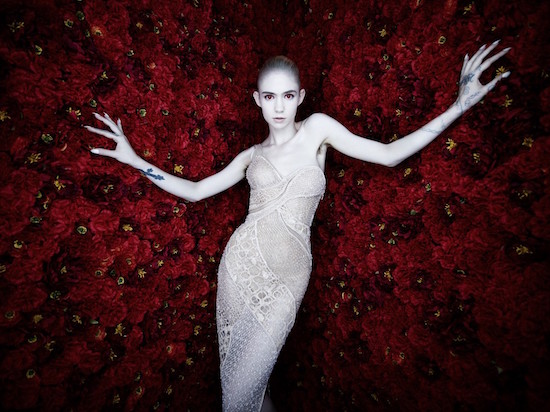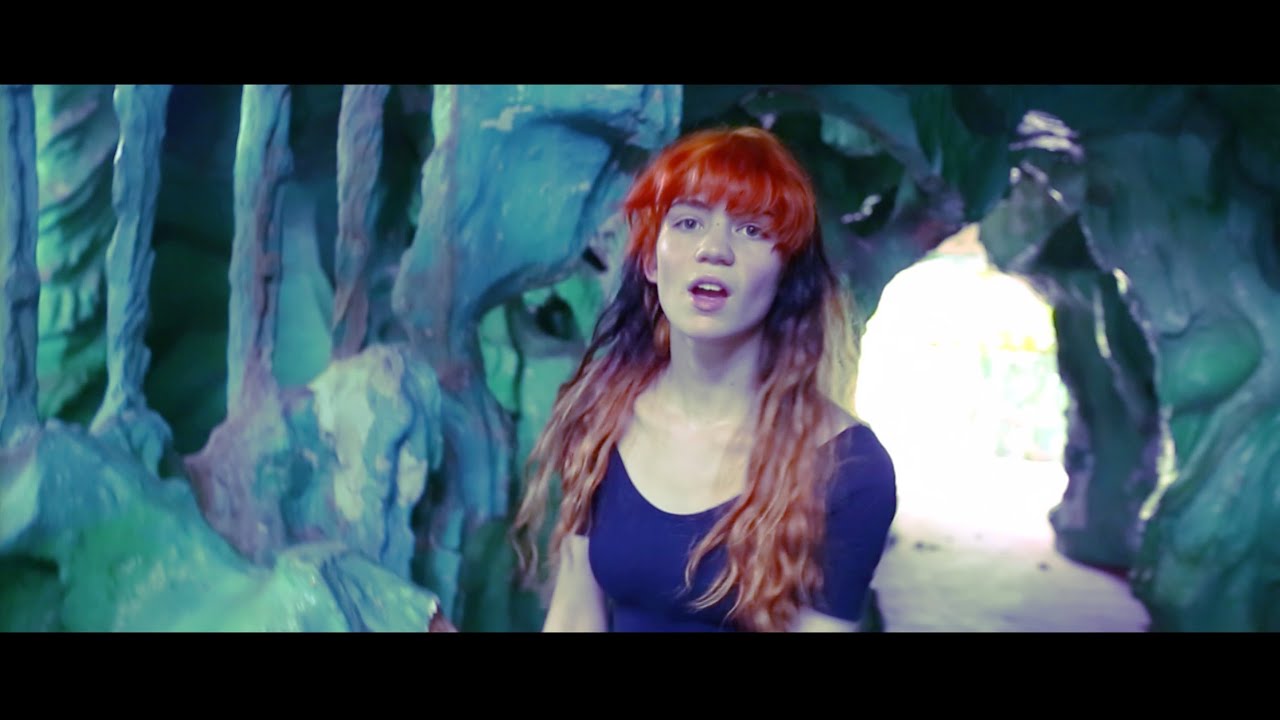An accusation often leveled at Generation Y — millennials; the first social media generation — by people who are able to use terms like “Generation Y” and “millennials” without irony and without them leaving any kind of rancid aftertaste, is one of a characteristically poor attention span. Instant gratification, the ubiquitousness of Facebook; the idea that the perpetual digital waterfall of immediacy and inadequacy that is Twitter, has rendered us unable to concentrate for any period longer than the cycle of the average gif. As a stereotype it’s both a convenient way to dismiss an unfamiliar culture or an alien way of being and, as with the great majority of sweeping generalisations, probably, factually inaccurate.
It’s March 2016, after all. It’s March 2016 and it’s a year since Claire Boucher released the video for ‘REALiTi’, the first piece of music from Art Angels – the Canadian artist’s fourth studio album as Grimes – and nearly five since the album itself was officially released. If we’d thought 2015 was the year of Grimes – of anticipation, of drip-feeding, of eventual pay-off – then its apparent continuation, the persistence of “buzz”, perhaps signals something more substantial.
On a personal level, it’s been a haunted year. First, stalked since that previous March by the mercurial arrival of Art Angels (or its possible failure to launch), making do with a near addiction to the video-rip demo of ‘REALiTi’’ – which to my mind, despite being in Boucher’s words “just the most basic kind of demo”, remains superior to the polished album version. Later, followed between countries and continents, from London to Reykjavík to Montreal to a Skype call in my childhood bedroom, by the spectre of the interview. A shadow in the peripheral vision, always just out of focus, my own peculiar, benign Babadook.
Boucher herself – not unlike the concept of a benign Babadook – is very much a living, breathing contradiction: an artist who is seemingly as self-assured in her work at this point of her career as she’s ever been and one also constantly doubting both her performance and the words she looses over the line to, and occasionally tries quickly to reclaim back from, me.
Commenting on what was, by all accounts save a few technical mishaps, a well-executed and near-euphoric Grimes performance at the Canadian festival M For Montreal last year, I’m met with self-effacing gratitude (not, just to be clear, that she owes me any gratitude at all) and an instant dilution of praise: “I feel like I should have had an encore; I really need to figure that out.” But still – she’d given them warning, and the very fact the crowd was so madly, so exasperatedly clammering for a reprise surely showed that the new material not only sat well with the old, but that it resonated just as well? “The priority in that situation is that they enjoyed themselves, I suppose. But it doesn’t work, I don’t think.” It’s indicative of the general (overwhelmingly positive) reaction to the album, too, I suggest. “Yeah, it’s been extremely… it’s been really nice.”
Just a few minutes into our conversation Boucher’s early hesitation, though not oppressive or any kind of real impediment to asking questions, is palpable. There’s an odd noise on the line which I think sounds like typing, but she later tells me that her first guess was that I might be “near a train or a brook or something” – but that doesn’t quite account for it. It’s possible there’s an elephant in the audio-digital room, poorly hidden under a serviette.
Reports of Boucher scrapping an entire Grimes project or – more recently – denouncing her entire back catalogue have been met with stony response and suggestion of misrepresentation. “In the past,” I begin somewhat tentatively, “people have taken things you’ve said of context. About your previous work, comments about particular artists and genres. I just wonder if you think the media does that because they don’t like the idea that a female artist can have a sense of humour; that what they assume is deadly serious coming from you they’d be happy to take as sarcasm or self-laceration from a man?” There’s a pause and I wonder immediately if I’ve overplayed my hand; if being both a man and a part of the media in question has put Boucher on the back foot and pretty much confirmed the answer – a kind of self-fulfilling prophecy.
But after a moment, she exhales and even over the quasi-aquatic static there’s a sense that any tension has lifted. “It’s difficult. It’s hard to say. Because I’m also Canadian, so I’m constantly making self-deprecating comments – I think a lot of Canadians do that. But, I mean, I do give a lot of soundbites; I should probably cut down on the soundbites. But I don’t know if it’s a gender thing – I’m just really bad at editing myself. I speak before I think.” I make the sound I hope is the vocal equivalent of a nod of agreement. “It’s tricky. People just take everything you say out of context. I’ve kind of given up on it now, it doesn’t make me sad or depressed, and it’s a lot easier to just exist.”
It’s no secret that Art Angels – the final product, however many iterations there were in the almost-four-year gap that followed Visions – has been a long time in the making (particularly measured by those supposed attention deficit standards of her generational peers). The spirit of the show in Montreal was very much one of inclusiveness, and the time between records has given Boucher time to work with other artists both on the album (Janelle Monae, Aristophanes) and off (Blood Diamonds – now BloodPop).
“I don’t think it’s really that much of a collaborative spirit. There’s a culture right now; there’s lots of people writing by themselves, and I think I’m just kind of collaborating the same amount.” It’s an answer that reminds me, by virtue of the collaborative nature of the genre, of a comment Boucher recently made about the content of the album – that it definitively wasn’t pop music.
“I think what I meant is that it’s just not Top 40 music. I consider the Ramones pop music or – I don’t know – the Smashing Pumpkins make pop music in my opinion. What bothered me initially is just the idea that you mention Beyoncé once in the press three years ago and suddenly you can’t seem to get away from it. I’m on an indie label. I couldn’t even get on Top 40 if I wanted to, you know?”
Putting aside the fact that Art Angels peaked at 31 in the UK Official Chart and 36 in the US Billboard 200 to name only two of the worldwide Top 40 positions the album has occupied, it’s still easy to see how that might be frustrating.
“I totally love and respect that kind of music; I love listening to it. I exist in a totally different world. I don’t want to be held up to those standards; I don’t want to be compared to those ideals – that’s just not what I do, you know?” It’s a train of thought that puts to rest some confusion that both I and Art Angels itself seem to harbour: the question of whether or not it’s pop music and, if it is or isn’t, exactly what that might mean in the context of contemporary art.
To my mind, the answer is yes – but talking with Boucher, it’s clear that the answer depends entirely on how you define pop. For some, myself included, it’s a genre of music and one as capable of spectacular feats of artistry as any other. To her it seems more a question of ideology and aesthetics, rather than a comment on the quality of the work itself: “I can’t really walk in heels and I’m not really the world’s greatest vocalist. It really bothers me that people are so intent on trying to see if they can compare Art Angels to, you know, Taylor Swift or whatever. It’s just not the world that I’m operating in.” And in a sense it’s true: there’s a lot of other stuff on this album that exists before you even get into that kind of music, before you peel the onion to the point that those comparisons are anything other than lazy ways to draw links between female artists. And, as much as the album itself might have penetrated numerous Top 40 membranes, according to Boucher there really isn’t a direct Top 40 influence on this record: “I purposefully didn’t listen to the radio the whole time I was working on it. I just think people are equating better vocals and better production with pop.”
As the conversation continues, it’s becoming clearer and clearer to me that any apparent eschewing of the pop genre isn’t necessarily a question of distaste for what that term signifies after all, but rather a frustration with an overarching and pervasive arbitrary classification of music into genres – categories designed to eff the ineffable, to make things easy (and easily marketable). “I think it’s just very hard to speak about music. There’s no kind of inherent qualities to any music, there’s not even a great vocabulary for talking about music,” she continues, “Like, what? Loud, quiet, dark, bright, soft – they’re not actually words to describe music: they’re metaphors. It’s like talking about things that are intangible. It’s hard to describe, and I think it probably bothers any artist.”
Art Angels, then, is an exercise in world-building and in armageddon: in the deployment of recognisable forms, of structures and of atmospheres, and their subsequent necessary razing. As Amy Pettifer wrote, the album is “a fever dream of perfect, unsettling pop for a crumbling world. Jaw-breaking, brain-rattling and polymorphously perverse.” Would this have been possible if Boucher had been immersed, during her writing, in the continuum of contemporary music, I wonder. I’m reminded of that scene from Inception where Cobb is explaining why you should never build dreams from memory: is it possible to create a world truly of your own making with the idea of a world that already exists imprinted on your mind?
“I think I’m usually pretty closed off. I like to, like, have a vague idea of what’s going on, but I think it’s good to not be too involved. If you’re trying to make something, you don’t want to engage too much with whatever else is current, because then you might start being influenced by it. I think that’s also one of the benefits of working alone: it’s easier to make something that’s kind of a world in and of itself. You can just get into a place and zone out. I don’t know. It’s not the same if there are other people there.”
While Richard Dawkins seems in recent years to have done almost everything he can to expunge any kind of credibility from his record, the concept of the blind watchmaker is one that continues to resonate regardless of the man’s transformation from noted evolutionary biologist to social media troll. That things happen, not by design or by virtue of some grand plan but out of circumstance and necessity, holds true here, too. As much as Art Angels is a self-contained universe, as meticulously, painstakingly put together as it seems, when I ask Boucher what she had in mind when she sat down to put the record together she doesn’t have a Manifesto for Creation. “I was working on some stuff but I didn’t love it. And then I started playing guitar, and pretty soon after I started playing guitar I thought, ‘Man, I want to make loads of guitar stuff’. I wanted to make an emo record or a rock record or something like that. But I couldn’t do that because I’m so electronic: it just ended up going in another crazy direction. It’s just a different take on a kind of medieval rock. Things are connected but also disconnected; each song’s like a world of its own within a world.”
Like any creator, Boucher’s hand isn’t guided by omniscience – by some intangible artistic muse – but by its own constraints and unique circumstance. It’s a refreshing take on the process, and one that feels unusually honest in debunking the myth of pure inspiration in favour of the more earthly maxim that nothing happens in a vacuum.
It’s a theory not without its inconsistencies, though: Art Angels is both a testimony to Boucher’s total surrender to her capabilities and limitations and an exercise in her undeniable perfectionism. After all, it’s not that she couldn’t have made a guitar-heavy emo record – the finished product just wouldn’t have been as good as the album that we have. And I wonder how the ad hoc nature of the pre-release months figures into that dichotomy – why, for example, the video for ‘REALiTi’ was made with the demo and pushed out into the world early, rather than with the final version – which itself never made the physical release. “It sounds ridiculous, but we weren’t planning to make a music video,” she explains, apparently wary that it sounds like she’s weaving her own set of Grimes creation myths. “My brother came with me on tour and we were going to make a kind of a tour diary. But once we got to Singapore, we just thought, ‘Holy shit, Singapore looks really good, we should shoot a video here’. And ‘REALiTi’ was just a song: I let him go through all the songs I had on my computer and that was the one he liked the best. It was totally random. I didn’t think I was going put it out or anything. I just did it for good vibes.”
Good vibes. That makes sense. It was, after all, the infectious positivity of ‘REALiTi’ that had kept me coming back for more; its all-consuming wave of “fuck yeah” that had left me dazed enough when the track ended to repeat it over and over each time; its irresistible enthusiasm that was able to lift me, if only momentarily, from a day-to-day state of near-perpetual emotional neutrality.
Not only that, but it also suggests a kind of symmetry – a warmth and subjectivity to a potentially cold, self-referential creation by process. “The song to me is super-nostalgic of that time. I can’t separate it from the time in mind: I had so much trouble re-recording it because it felt like it was such a time capsule. It was weird to modernise it.” An unmistakably human touch. Subtle proof of Boucher’s unique presence. Footprints in wet sand.
“I think that’s one of the really trippy things about making music – and especially about touring. Even now, I was just working on a video for ‘Kill V Maim’ and it feels like I made it about a decade ago. I can’t even really remember making it anymore. All the songs are these very time-specific pieces – but only for me. Because I write and record at the same time so it coalesces in a very short period of time. It was really trippy for me to go back… even the mixing process was hard.”
While there may have been no masterplan for Art Angels itself, Boucher is clear now about what she wants for her audience when they experience the record: a kind of state of hypertension. “I want it to feel like The Godfather or something. Not as good as The Godfather, obviously, but in the sense that when you’re listening you think, ‘Oh, sick, that’s so cool’ – you’re really stressed out and have lots of anxiety, but you’re also really entertained.” Chewing the ends from your fingers but having a great time doing it: “Like watching Ultimate Fighting Championship. Like the feeling you get from watching people fighting. That’s the feeling. But then, also, at some points it gets really, necessarily dreary.”
It’s a pretty neat encapsulation of most people’s life as a whole: of expectations both managed and all-consuming, of often overwhelming but occasionally exhilarating anxiety, and a prevailing monotony that cannot and should not be ignored or presumed to be worthless. And maybe this is where the misconception of millennial complacency has its roots. Y, as a whole, better observes its place as within: as subject to the parameters of life. As transient; accepting that the confines and limitations of memory and subjectivity are not to be overcome – to be conquered in the Boomer/X style – but embraced, not in total irreverence of history, but in favour of the value of this present moment regardless of what that moment brings.
Follow @karlthomassmith on Twitter.
Art Angels is out now on 4AD. Grimes plays Brixton Academy tonight, March 10, with HANA




